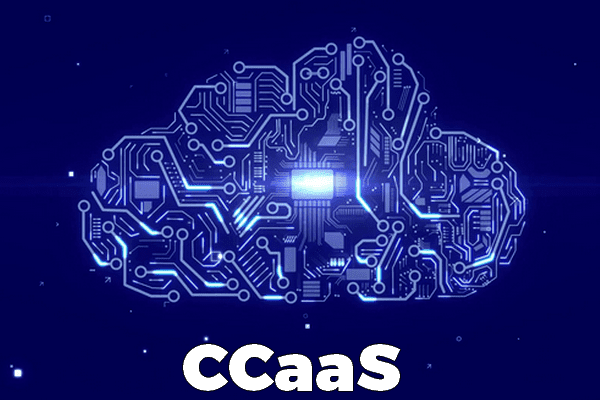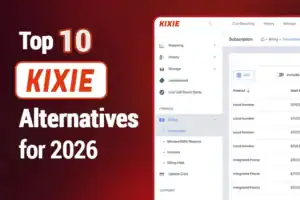Customers nowadays expect a high level of service. Can a CCaaS offer them the service they require? It’s pointless to offer outstanding things at the lowest possible price if you can’t deliver exceptional customer service. That is true for all sectors.
Your contact center serves as your company’s storefront. Customers will build an opinion, favorable or bad, of your customer service and so of your brand from the very first transaction.
When you employ contact center as a service (CCaaS) software, you enable your call center employees to better their work and boost your bottom line by optimizing the client experience. What exactly is CCaaS? What makes them the future of customer service? A CCaaS is a multi-channel contact center solution that is critical to a company’s growth.
It is a software system that improves customer service efficiency by utilizing a call center solution that manages several channels particular to a business.
What exactly is a CCaaS solution?
 Contact center as a service is abbreviated as CCaaS. It refers to cloud-based software solutions used by call center personnel to give a better overall customer experience. The infrastructure is hosted in the cloud rather than on your own servers. A CCaaS solution’s principal goal is to appropriately route calls and maintain track of your customer interactions.
Contact center as a service is abbreviated as CCaaS. It refers to cloud-based software solutions used by call center personnel to give a better overall customer experience. The infrastructure is hosted in the cloud rather than on your own servers. A CCaaS solution’s principal goal is to appropriately route calls and maintain track of your customer interactions.
The software is developed and updated by CCaaS providers. In practice, CCaaS refers to a cloud-based phone system or other communications software that enables a business to conduct inbound and outgoing interactions with customers or prospects. Contact center as a service (CCaaS) technologies are transforming the interaction between contact centers and their clients.
Prior to using CCaaS solutions, businesses relied on VoIP, or voice over IP, technologies.
A look back in time
Contact centers were the primary users of on-premise technology 20 years ago. The operational concept was considerably different from that of contemporary systems, which use software installed on internal servers or PCs. The expenses of deployment and updates were high since the investment had to be ongoing, both in terms of infrastructure and employees working on the program.
Companies came in the early 2000s and defied the trend by offering cloud-based outsourced solutions. The main distinction was in the method the program was created. Instead of using a PC to access the program, personnel may use any web browser to get the complete functionality. This approach provided several benefits and significantly decreased maintenance expenses. Because of the software’s high level of flexibility, it was feasible to reply to highly particular demands and work from home or on the road, outside of the call center.
The current generation of CCaaS has resulted in significant changes in enterprises, since flexibility and lower IT costs have rendered previous versions of CCaaS outdated.
In an increasingly competitive economic environment, cloud technology is becoming a crucial component in corporate efficiency. Analytics and reporting tools are watched in real-time from any computing device that is connected. Employees and consumers alike benefit from live customer relationship management.
This digital migration to the cloud has been a significant move that has shaken up team collaboration tools. Cloud-based services have cleared the way for more adaptable and inventive solutions to satisfy the demands of new contact centers. Today, a CCaaS enables your contact center consultants to access your contact center software from any browser, at any time, from any location.
The market is continuously changing, as are the demands of your clients. A CCaaS solution provides you with the advantage of being able to swiftly adjust to all of these changes. In sum, traditional phone systems are costly and inflexible and continuing to use them risks slowing down your organization.
Cloud-based phone systems that integrate with other CCaaS applications provide the agility and flexibility necessary to compete in a competitive market.
What you need to know about VoIP and CCaaS
Simply explained, VoIP is a technology that allows phone calls to be made and received over the Internet.
Prior to the introduction of IP telephony, businesses relied on analog phone networks for many years. However, with the expected demise of the PSTN, this technology will eventually go away. Because the technology is not flexible enough to support new software solutions and novel integrations, the options are limited.
Email, chat tools, web apps, CRM systems, online survey solutions, sales automation tools, and helpdesk software are all integrated into CCaaS software. This combination results in a multi-channel system that serves as the foundation for a contact center. The voice feature of a CCaaS is powered by VoIP technology.
Why are businesses choosing CCaaS solutions?
 Before we get into how you can use CCaaS to expand your business, let’s define it. CCaaS is an abbreviation for “contact center as a service.” In other terms, it refers to the use of software hosted in the cloud rather than on your company’s facilities. The software is maintained and updated by the vendors of this sort of service.
Before we get into how you can use CCaaS to expand your business, let’s define it. CCaaS is an abbreviation for “contact center as a service.” In other terms, it refers to the use of software hosted in the cloud rather than on your company’s facilities. The software is maintained and updated by the vendors of this sort of service.
CCaaS technology is intended to offer call and contact centers with a full set of sales and customer support functions. It allows you to consolidate and effectively route connections across all of your communication channels.
Prior to the widespread use of cloud technology, contact centers relied on space-consuming in-house computers and servers. Installing and maintaining this equipment was costly. Companies were required to recruit a team of experts as well as bear the price of hardware and upkeep.
It wasn’t until the early 2000s that businesses began to use cloud-based technologies. Users may now access software and systems simply by connecting to the Internet, thanks to improvements in cloud technology.
The fundamental benefit of a CCaaS system is that it allows you to keep using classic contact center operations (call routing, call recording, message, etc…) while adding numerous novel possibilities. However, before deciding on a CCaaS solution, you should take into account all technical and commercial challenges.
What are the advantages of using CCaaS software?
Customers seldom have a favorable impression of customer service and are ready to share their displeasure with them: Long wait times, several service transfers, too confusing IVRs…
Traditional contact centers frequently operate in isolation. The company’s many divisions may utilize different tools and may not have easy access to key information and client accounts. In this instance, customer service representatives or salesmen lack all of the tools required to give acceptable service to consumers.
These difficulties are well addressed by CCaaS software. Here are some of the advantages of using a CCaaS solution:
- Maintenance and equipment expenditures have been reduced.
- IT support expenditures have been reduced.
- The ability to swiftly and effectively grow your call center.
- Capability for multi-channel communication and monitoring of communications on each channel.
- Establish on-site or virtual call center teams.
- Capability to collaborate with remote or multi-site teams.
- Dashboarding and reporting options for actionable call center data.
- For all client accounts, operators have access to a single data source.
- A single point of contact for your cloud telephony system and software integrations.
- There are no upfront costs for hardware or installation.
- Increase your operators’ availability to service clients.
- You only pay for the tools you require with a subscription-based service.
- Connect your business phone’s capability to your CRM and other business tools.
- Get access to all of the tools you need to provide the greatest customer experience possible.
The final and possibly most crucial goal is to “provide the finest possible client experience.” Make this your major emphasis to secure the success of your firm.
A CCaaS enables you to track the activities of your call center operators in order to quickly detect and handle the most prevalent problems. Data analysis and call statistics can assist you in establishing the proper strategies for coaching and training your teams.
What other benefits can CCaaS solutions provide?
 There are various CCaaS options accessible, and the market is brimming with unique alternatives. However, not all solutions will meet the demands of your firm, and you should select the CCaaS solution that you believe is the most comprehensive. Indeed, a good call center software system should enable rapid information sharing in order to give a better contact center experience for the client. In addition, a cloud-based CCaaS solution should improve team structure and call flow management. From interactive voice servers and queuing to data security and sophisticated data such as statistics and reports, a good call center software solution should be as comprehensive as possible, with a tailored dashboard to maximize its usage and get the highest productivity outcomes.
There are various CCaaS options accessible, and the market is brimming with unique alternatives. However, not all solutions will meet the demands of your firm, and you should select the CCaaS solution that you believe is the most comprehensive. Indeed, a good call center software system should enable rapid information sharing in order to give a better contact center experience for the client. In addition, a cloud-based CCaaS solution should improve team structure and call flow management. From interactive voice servers and queuing to data security and sophisticated data such as statistics and reports, a good call center software solution should be as comprehensive as possible, with a tailored dashboard to maximize its usage and get the highest productivity outcomes.
If selecting a call center software is difficult, another factor to consider is the enhancement of user agent performance. To do this, a decent CCaaS must provide discrete listening, allowing your agents to be best controlled by your management teams. A CCaaS system should assist agents to avoid missing calls through effective queue management control, with the purpose of increasing customer loyalty and enabling communication. Other elements that may help you enhance your customer relations include extensive reporting, the number of answered and lost calls, the wait time for each call, and the overall average wait time, all of which are necessary to improve your contact center performance. Finally, a strong CRM integration should be included in the ideal CCaaS system to make it easy for your agents to utilize.
Customizing a CCaaS solution for your business
However, for the finest customer service, select the one that best matches your company. Although the objective in virtually all situations is to increase revenue, good call center software should first and foremost improve client relations, allowing you to communicate with them in the best possible way. Your CCaaS is a valuable resource for contact management, analytics, and productivity. To select the finest CCaaS solution, it is critical to select a solution that is precisely suited to the structure, business, and industry. But how do you go about doing that?
A successful CCaaS solution, tailored to your needs, should promote interactions among the company’s stakeholders: suppliers, partners, workers, colleagues, customers, and so on. The solution is the key to not just deeper but also boosting your marketing plan. Adapting it to your company’s size and values provides the CCaaS solution with the best chance of success. When a user calls the contact center, this is the key to distinguishing yourself and establishing an impact. While the choice of the solution may be more complicated owing to the amount of options available, the ideal CCaaS solution should allow for customization of the user interface, full management of the exchanges, and adaptability to reducing or growing call volume. The flow does vary, and your call center software should adapt to you rather than the other way around!
The sheer variety of offers and services on the market might make selecting a CCaaS solution challenging. With a focus on quick time to market, complete software that gives the greatest performance without raising running expenses, and agent simplicity of use, you’re guaranteed to make the finest decision in the contact center CCaaS solutions!
List of variables to consider
Here’s a list of the most important factors to consider when selecting a CCaaS provider:
- VoIP telephone system
- Software for call centers
- API integration and business tool capabilities
- Capabilities in several channels
- Service level agreements (SLAs)
- Service availability and operator redundancy
- Installation and usage simplicity
- Dedicated assistance and monitoring
- CCaaS has a promising future.
 The situation is not static; technology is developing, and CCaaS still has a promising future. The future of CCaaS is promising, owing to the fact that just 36% of contact centers now use the most recent version of cloud technology.
The situation is not static; technology is developing, and CCaaS still has a promising future. The future of CCaaS is promising, owing to the fact that just 36% of contact centers now use the most recent version of cloud technology.
The market is still thriving, particularly for organizations with older infrastructure. As IT maintenance costs rise and downtime lengthens, a shift is required to maintain technical balance and maintain a competitive edge.
The cloud provides capabilities that a local infrastructure cannot, and small and medium-sized businesses have been the corporations with the lowest expenditure. They are now learning that CCaaS pricing is still inexpensive, especially for small businesses.
Another advantage of the cloud is the democratization of technology, which allows both huge corporations and small businesses to use powerful software.
Cloud-based phone systems are the future
If you think about all the times you’ve been in contact with a contact center, you’re bound to have both pleasant and terrible recollections. In any case, the level of service you experienced is likely to have impacted your view of the organization.
Companies nowadays have no option but to aim for customer experience excellence. Customers dislike being linked to a voice server in general. They prefer human interaction because it allows them to ask questions and receive prompt responses. However, how do you handle huge call volumes?
Every year, the largest call centers connect millions of individuals. Users believe that online customer support is of poorer quality than in-person support, according to a Forrester poll. In any situation, a dissatisfied consumer will not return.
Aside from making your firm appear nice, the cloud phone system offers several advantages. A CCaaS solution enables you to extend your operations as your company expands. Furthermore, when business is brisk, businesses may readily increase their service throughout the year.
Because upgrades are quick and simple to apply, a cloud-based phone system is an excellent method to save maintenance expenses.
A CCaaS also helps to optimize a contact center’s productivity and save costs without sacrificing service quality. CCaaS software, unlike traditional phone systems, enables your workers to work from home.
The challenges of Migrating to CCaaS
Before contemplating a migration, organizations who have previously invested in an on-premise contact center solution should evaluate the following:
- When is the optimum moment to adopt a CCaaS solution to optimize current investments?
- How can we avoid feature loss and assure the continuity of peripheral services like CRM integration and other in-house systems, labor management, and quality assurance?
- What is the best strategy for ensuring a seamless transition, and what change management measures are required?
- What processes are in place to maintain the solution’s security, as well as the confidentiality and availability of data?
As for the provider you’re going to choose, they have to answer the following questions:
- What features does the supplier supply that are relevant to the contact center’s requirements?
- Do they provide a flexible pricing plan that takes into account available resources?
- How fast do they introduce new capabilities and features?
- Can they support the regulatory operating environment of the industry?
- How trustworthy and safe is their service?
- How do they track and report on performance and satisfaction?
- What kind of service and support do they provide, and how do their clients evaluate them?
- How do they facilitate scalability and customization?
To achieve a successful cloud migration, services must be piloted and tested before going live. Testing allows the company to become acquainted with the contact center’s new features at its own speed, ensuring that the new product is fully functioning before it is made available to consumers and support professionals. Given that a contact center is frequently the initial point of contact for many clients, it is critical that any new technology is thoroughly tested before being launched for public use.
NobelBiz Answers all those questions
With the NobelBiz Cloud Contact Center technology, you can transform your Call Center into a high-performing Contact Center thanks to our solution NobelBiz Omni+ that can be tailored to the specifics of every company in the Call Center industry. And because we are known as the promise keepers of the industry, we provide you with a complete solution for all your contact center needs.
A software platform designed to be fully remote, easy to use and install, and integrated with all communication channels and offering you a true omnichannel experience. NobelBiz Omni+ is a contact center solution built to be fully compliant with industry software standards so integrating it in your company’s workflow takes less than 72 hours. You will have at your disposal a user-friendly interface and a completely web-based platform and a perfect tool for remote work.
Here’s what makes it the best omnichannel software in the industry :
- Completely Web Based
- Redundant and Scalable
- User-friendly Interface
- Secure Dedicated AWS Instances
- Fully Compliant

Abdelmounim Benharouga has always had a strong passion for writing and digital marketing. He started as a Digital Content Writer part of marketing department then moved to being Customer Success Manager for the African Region within the Nobelbiz team.






